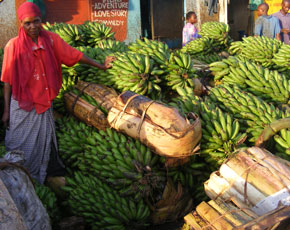
By Patrick Kagenda
From October 5 to 9, a conference bringing together over 60 banana growing countries from Africa and the Caribbean was held in Mombasa, Kenya under the theme: Harnessing International Partnerships to Increase Research Impact.
Over 450 people attended the conference organised by the International Institute of Tropical Agriculture (IITA), Biodiversity international, Forum for Agricultural Research in Africa (FARA), International Society for Horticultural Science (ISHS) and Kenya Agricultural Research Institute (KARI) and funded by the Bill and Melinda Gates Foundation. Uganda institutions like NARO and the Presidential Initiative on Banana Industrial Development (PIBID) participated.
At the conference, it emerged that bananas are increasingly being targeted for income generation through Public Private Partnerships (PPP) to alleviate poverty, fight hunger, and improve nutrition. Bananas contain Vitamins A, B6, C and potassium.
Despite being the world’s second largest producer of bananas, Uganda features nowhere near the world top 10 exporters. 90% of bananas produced in Uganda are of the plantain type which is consumed locally with very little for export.
Statistics from PIBID on the amount of bananas produced in Uganda indicate that Uganda produces 9.9 million metric tones of bananas annually and most of it is consumed locally. Uganda is ranked 70th world exporter though the amount exported is not officially tabulated as exportation is done by small exporters.
That is set to change.
A banana processing factory is being constructed at Nyaruzinga in Bushenyi district in western Uganda to process bananas into flour, called Tooke Flour. The factory, planned to be in production early next year, will also serve as a training center for farmers in banana drying to be processed.
Most bananas are exported to the European Union, USA, Japan, Russia and Canada.
Rev Dr. Isabirye Muranga executive director at the PIBID told The Independent, “when the factory to be constructed in Bushenyi to process Matooke starts production, Matooke will be eaten anywhere in the worldâ€.
At the Mombasa conference, PIBID showcased bananas in different forms. Three chefs; Ronald Muhereza and Henry Omusuga of Kampala Serena Hotel and Jeremiah Kiyongo of Imperial Royale Hotel, who had won in a local Tooke Competition, demonstrated different recipes of different types of Tooke.
“We made a key note address on PIBID as being value addition on matooke,†Dr Isabirye said, “We are not for business but to fight poverty levels, increase out put from the current five metric tones per acre to 40-80 metric tones per acreâ€.
She dispelled fears that the processed bananas could create scarcity on the local market saying the training they are giving farmers will increase banana production. She said preliminary investigations reveal that bananas will become cheaper than maize and wheat flour. Tooke flour will be used in baking bread and pastries.
Worlds largest producers of bananas
|
Isabirye said the major challenge would be maintaining sustainable production to keep the factory running and automation as it would require a uniform size of banana.
Earlier her deputy Dr. Bahati Joseph had told The Independent, they are zeroing on five varieties of the 26 known varieties of bananas grown in Uganda. The five are Mpologoma, Kisansa, Kibuzi, Mbwazirume and Enjeru.
The PIBID project is currently running in Bunyaruguru County in Bushenyi district where up to 27 parishes are involved with three farmers from each parish being trained to become trainer of trainers. Central to the training is the use of drip irrigation by an Israel firm.
The project will spread to the districts of Kabarole, Masaka, Mbale, Paidha, Kiruhura, Mbarara and others.
Bahati says PIBID aims to reduce post harvest loses and increase shelf life of the bananas.
“When the factory starts production and people accept the product there will be no more garbage in the cities as most of the garbage is of banana peelings and leaves,” he said, “The entire banana by-products will be returned to the plantation as manure, though farmers will also add factory made fertilizers especially potassium.”
A 50 kilogram bunch of matooke will produce 6 kilograms of Tooke flour. The project is financed by the government of Uganda under Ministry of Finance.
 The Independent Uganda: You get the Truth we Pay the Price
The Independent Uganda: You get the Truth we Pay the Price


